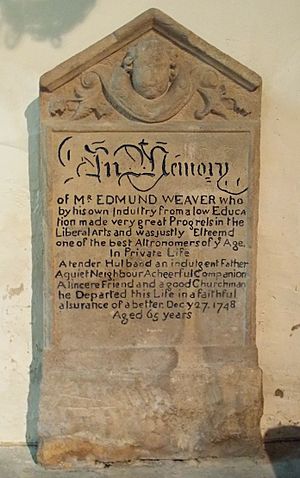Edmund Weaver (astronomer) facts for kids
Quick facts for kids
Edmund Weaver
|
|
|---|---|
| Born | c. 1683 |
| Died | 27 December 1748 (aged 64–65) |
| Nationality | English, British (post 1707) |
| Scientific career | |
| Fields | Astronomy |
Edmund Weaver (born around 1683 – died December 27, 1748) was an English astronomer and land surveyor. He was also a good friend of the famous William Stukeley. Weaver's book, The British Telescope, included special tables called ephemerides. These tables showed where planets would be in the sky. Many people think this book was very important for understanding how planets move in the 1700s.
Contents
About Edmund Weaver
Edmund Weaver was born about 1683. He lived in a place called Frieston in Lincolnshire, England. He passed away on December 27, 1748. Weaver was buried at St Vincent's Church, Caythorpe. This church is just north of his home in Frieston. Inside the church, there is a special memorial dedicated to him.
How He Learned
Edmund Weaver taught himself most of what he knew. He became very skilled in astronomy on his own. This was quite unusual for his time.
His Work in Astronomy
Weaver wrote his important book, The British Telescope. This book made him well-known. Historian William Stukeley admired Weaver greatly. Stukeley said Weaver was "a very uncommon genius." He believed Weaver was one of the best astronomers in England. Because of Weaver, Stukeley himself became very interested in astronomy.
Understanding the Universe
Weaver believed in the heliocentric view of the universe. This means he thought the Earth and other planets orbit the Sun. This idea was still quite new and debated back then.
He also defended the accuracy of ephemerides. These are tables that predict the positions of planets. Some people, like Tycho Wing, criticized the tables made by Edmond Halley. Halley was the Astronomer Royal, a very important position. Weaver stood up for Halley's work.
In his 1741 edition of The British Telescope, Weaver wrote about the path of the 1769 transit of Venus. He correctly described this path as curved. He also explained that planets move in elliptical (oval) paths. This work caught the attention of the Royal Astronomer journal.
His Work as a Land Surveyor
In 1734, Edmund Weaver planned a big project. He wanted to create a detailed map of the entire county of Lincolnshire. He printed a document called Proposals for making and publishing for Subscription an actual Survey of the County of Lincoln.
The Lincolnshire Survey Project
Weaver started this mapping project, but he never finished it. Only a map and some measurements of roads and distances remain. The plan for the survey was very detailed. It would have included:
- All the local areas called wapentakes.
- Churches, chapels, and religious buildings.
- Hunting grounds and parks.
- Important houses and castles.
- Homes of noble families.
- Every parish and settlement.
- All waterways, bridges, and roads.
Weaver planned to use the best technology available at the time. The final map would have been fully indexed. This means it would have had a complete list of all the places. A writer for The Gentleman's Magazine looked at Weaver's notes after he died. They described him as a "noted Astrologer, Almanack-maker, [and] Land Surveyor." This shows he had many different skills.
 | Percy Lavon Julian |
 | Katherine Johnson |
 | George Washington Carver |
 | Annie Easley |


